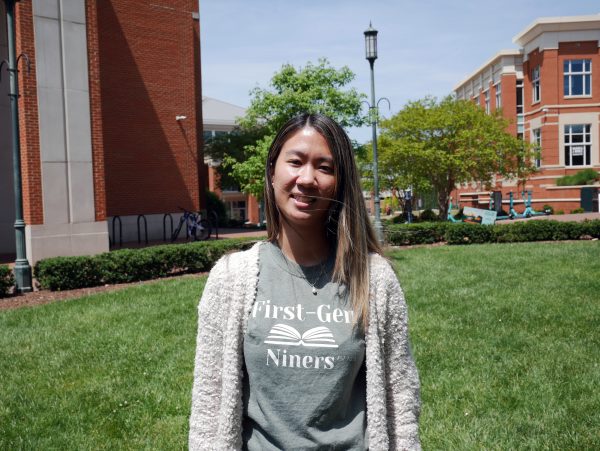UNC Charlotte Recognized for Supporting First Generation Students

During the pandemic, a new student-run organization began to take shape to connect and support students who identify as first-generation college students. First-Gen Niners brings together campus partners with students who do not have a family history of college attendance to form a support system for the unique challenges and obstacles that many first-generation students face.
For these efforts, UNC Charlotte is selected to the 2022-23 First-gen Forward cohort with the Center for First-generation Student Success, an initiative of NASPA – Student Affairs Administrators in Higher Education and The Suder Foundation. The First-gen Forward designation recognizes institutions of higher education who have demonstrated a commitment to improving experiences and advancing outcomes of first-generation college students. As a First-gen Forward Institution, interested faculty and staff can engage with peer institutions who are also creating environments that improve the experiences and outcomes of first-generation students.
“Through the application process, it was evident that UNC Charlotte is not only taking steps to serve first-generation students but is prepared to make a long-term commitment and employ strategies that foster an environment of success for this important population,” said Dr. Sarah E. Whitley, assistant vice president, Center for First-generation Student Success.
Lisa Insixiengma, a senior majoring in nursing, joined First Gen Niners when she transferred to Charlotte as a sophomore. She currently serves as the organization’s community outreach chair.
“I value being First Gen, because I admire the quality of resilience,” Insixiengma said. “Being a part of this organization provides reassurance that you’re not the only one going through a similar struggle. We are there for each other, and we support each other as we work to accomplish our goals.”
As a student in the highly competitive nursing program, Insixiengma says “I fought so hard to get here.” She says that First Gen Niners helps her stay on track. “When I am feeling discouraged, I take a moment to remember my ‘Why’. I have to focus on the end goal and that’s graduating from college.”
The main goal of First Gen Niners is to work together to learn what it is like to face obstacles in college, how to cope with different tasks, inform different approaches to scenarios and gain a support system that will be with students throughout their time in college.
The group has been meeting virtually due to limitations resulting from the COVID-19 pandemic. First Gen talk sessions are held on Instagram and have covered topics such as classroom techniques, career plans, family expectations, financial aid, scholarships, and food security.
“First-gen students often put more pressure on themselves than their peers, and the pandemic has heightened typical college challenges,” said Dr. Lorenzo Hopper, faculty advisor for First Gen Niners. “This organization connects students to resources and also encourages them to get engaged in the campus community, which is proven to increase their chances of graduation.”
The organization also has a collaboration with the Center for Counseling and Psychological Services (CAPS). Aayla Alexander (‘16), a licensed clinical social worker with CAPS, was a first-generation college student and now helps facilitate the First Gen Niners virtual drop-in space.
“I saw the value in creating a space for these students, because I know what it is like,” Alexander said. “When I came to UNC Charlotte as a student, I felt like a fish out of water.” This group provides a space to process challenges related to being a First-gen student, including navigating between the classroom, working a job and subsequently juggling the social aspect of campus. We also discuss the strengths and resilience connected to being a first-generation student.”
Research shows that mental health and wellness impacts the success of first-generation students in college. Therapists from CAPS talk with students about how their background has an impact on being a student.
“Many First-gen students juggle a lot of responsibilities. They often go to school full time and work many hours at one or more jobs. Plus they are adjusting to the academic rigor and getting used to being on their own for the first time,” said Phylicia Currence, licensed clinical social worker with CAPS. “Some students also struggle with imposter syndrome and may feel that one bad grade means that they don’t belong here.”
Mentors and other campus partners collaborate with First Gen Niners to support them through the entire college experience, whether that is just providing a space where they are heard and understood or connecting them with tools and resources to help them succeed.
“It’s important to celebrate these students,” Hopper said. “We want to help them feel proud to be a trailblazer.”